
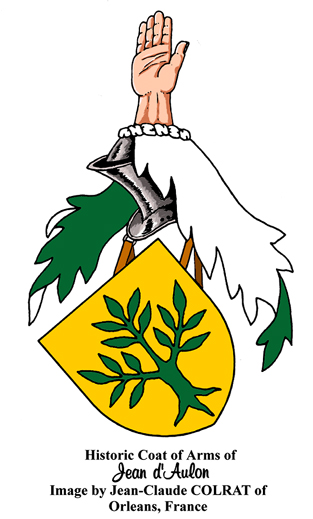


Jean d'Aulon, Part XV
CHAPTER 22
THE KING'S BETRAYAL
While she was enjoying the company of her family and friends, the King, La Tremoille and the Archbishop held secret meetings with the enemy. They made quite sure that Jeanne remained ignorant of their negotiations, while they formulated a truce with the Duke of Burgundy's chief emissary.
The truce stated that the French army would not engage the Burgundians or the English for two weeks. In return, the Duke of Burgundy promised that he would turn Paris over to the King without a fight. This of course was a total falsehood. How could the Duke of Burgundy betray his English ally or give away something that he did not possess, because in reality the English controlled Paris?
The King had an extreme aversion to physical violence. Lord George and the Archbishop used this fear and apathy to their own advantage, assuring Charles that through negotiations he could get all that he wanted without one drop of blood being shed!
At this point in his life, Charles was still a weak-willed man who did not really want to rule his kingdom. He did not care if the Duke of Burgundy was an ally of the English or that the Duke would hoodwink him over the possession of Paris. He had no thought for the suffering of his people who were still in the hands of the English and Burgundians. He was content to allow the enemy to have the north of France while he selfishly thought only about his own safety. Charles wanted nothing more than to enjoy the meager luxuries he had south of the Loire.
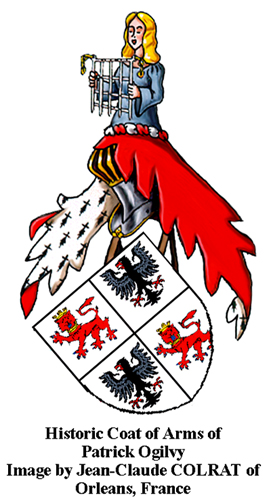
Commander Ogilvy offered Jeanne his fond farewell before he and his entire company of sixty men-at-arms and seventy bowmen departed for Orleans. Jeanne was sad to see him go because she had come to admire his skill as a commander.
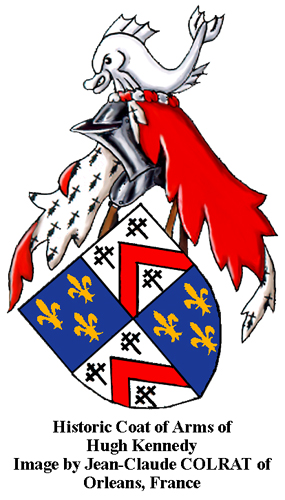
Catching sight of captain Hugh, who was coming over to speak with Lord Ogilvy, Jeanne called out, "Canède, will you be leaving too?"
"Well, brave lass," he said with a smile, "ye have a choice on that."
"A choice?"
"Aye. If ye’ll have us, my men and I will serve alongside ye always."
Jeanne's eyes sparkled as she took hold of Hugh’s hand, "Then, Canède my friend, you and your Scots will always be close by me!"
Hugh seemed greatly moved by her kind words, and doffed his hat to her with a long sweeping motion before turning at last to bid Ogilvy a safe journey.
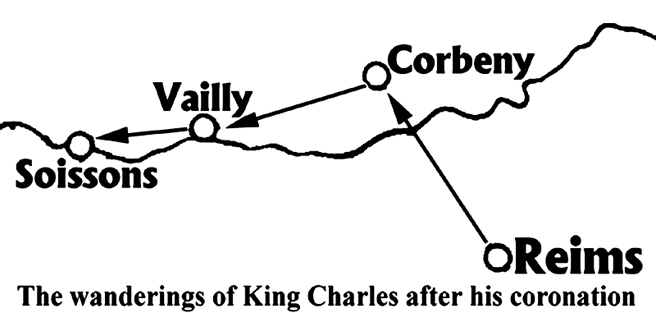
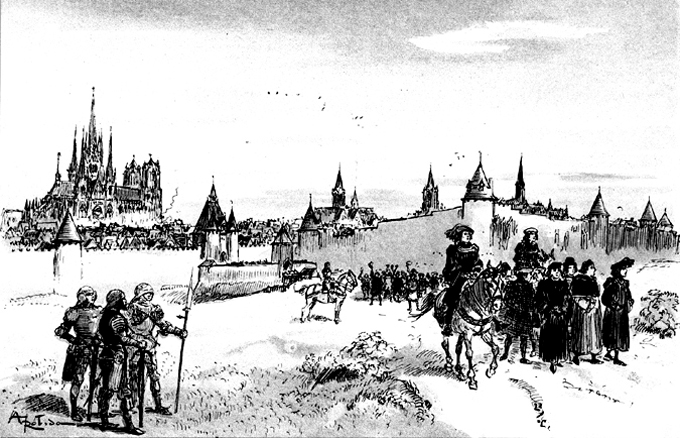
The King gave orders for the army and his entourage to march toward Soissons! Jeanne rode in the rear with her friends to avoid being near the King. As we were leaving Reims, I softly spoke with her. "Maid, I followed your orders to leave your battle standard in the cathedral, but Jeanne.., why would you want me to do this?
Forlorn and dejected she not looked at me, nor did she say anything as she bit her bottom lip. Not wanting to cause her any more pain, I waited patiently for her response.
We rode in silence for a long time. Finally though she did answer as she languidly shook her bowed head from side to side. "As a thanksgiving offering to my Lord, for allowing the King to be anointed."
"Yes, an offering is appropriate, but why your battle standard? Could you not have given something else? Now, what will you use in battle?"
"If we have an encounter with the enemy, I will use my pennon." Her voice cracked and tears welled up in her eyes when she said, 'if we have an encounter.' She allowed only a few tears to fall as she stoically rode on in silence. She contained her emotions well, considering how strongly she felt this betrayal. Did feelings of anger, resentment, and revulsion swell in her heart? Perhaps, but as I say, she rode that day very quietly, with only a tense manner to reveal her innermost thoughts.
On the evening of Thursday July 21st we made camp that evening at Corbery. Jeanne did not give up all hope that she would somehow persuade the King to move on Paris. So with determination, she marched herself unannounced into his presence. She went down on one knee and bowed her head low. "Your royal majesty, I beg you, go to Paris. The enemy will not withstand our attack upon them. We will defeat them. I beg you do not throw away this chance to regain your Capital." Jeanne said no more, but allowed her pleading eyes to speak for her.
The King barely acknowledged her presence as he continued to munch on a morsel of squab. "No, we are going to Soissons!" He turned and strolled indifferently over to La Tremoille and the Archbishop. Still holding the chewed leg bone tightly, he flippantly waved her off. "You may go."
Without a word, Jeanne got up and withdrew. The next evening at Vailly, Jeanne repeated her plea before the King. What had occurred the night before occurred again. He was totally uninterested in anything she had to say. Every evening, day after day, she repeated her entreaty and every evening, day after day, he dismissed her without a word. Carelessly he waved her away as if she was a pesky and persistent fly.
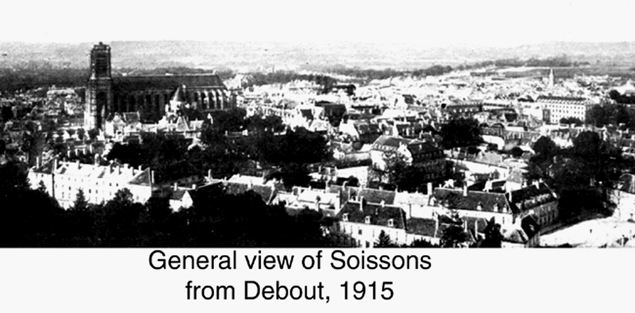
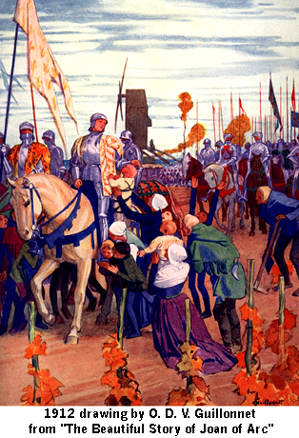
Arriving at Soissons, the King and his entourage stayed at the local Bishop's palace. Jeanne and her household on the other hand, stayed at the town's inn, close, but not too close, to His Royal Majesty. Here, with all due pomp and ceremony, the King received the emissaries from the towns of Laon, Cresy-en-Brie, Provins and Coulommiers, all of whom guaranteed their loyalty and obedience to him. The Archbishop and the Lord La Tremoille hovered around Charles like a bad smell! They took every opportunity they could to reinforce the idea that their negotiations had won him these towns. What lies! Had Charles so limited a memory? It was because he was King and not because of negotiations that these towns and cities came to him! Yet the King accepted the Lord's lies for truth.
As the King and his two trusted counselors, daily grew colder towards Jeanne the people's affection for her grew. Where ever she went the people, whether villager or town's folk, common laborer or wealthy merchant, they all came out to see this astonishing young Maid, whose miraculous accomplishments had brought hope back to their war weary lives. To my mind it was this love that kept her going despite the mounting opposition from the Archbishop and La Tremoille.

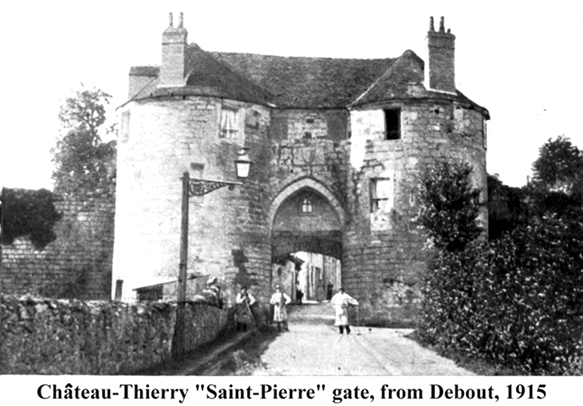
On the morning of Friday July 29th the air was hot and there were only a few clouds to block the sun's relentless rays. Jeanne with her personal staff as well as La Hire and his men came to the crest of a hill. We stopped there to view the mighty fortress town of Chateau-Thierry, which lay halfway down the steeply sloping valley that overlooked the river Maine. The valley itself was narrow and long, and the fortress held a commanding view of the terrain.
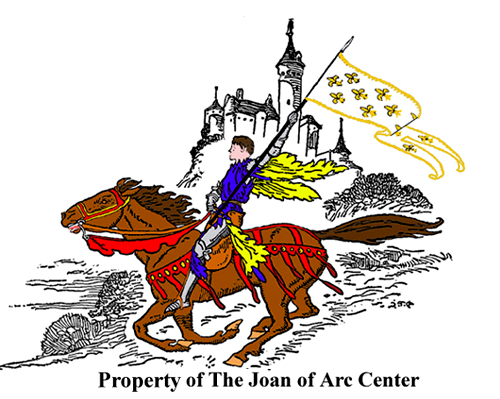
La Hire ordered the lords and burgesses of the town to surrender to the King. Jeanne directed the men to form up in battle order. We would attack if they resisted! With the bright points of the knights' lances gleaming in the sun, they waited for her order. The trumpeters raised their instruments to their lips and powerfully sounded the notes for the charge. All the men roared in a rousing cheer while some shook their pikes and others beat their swords against their shields. At once we lowered our lances and set our spurs to our chargers' flanks and galloped into action! Our powerful horses' hooves thundered and shook the earth as we rushed down from the hill's crest. It must have been an impressive and frightening sight because at our arrival before the stout towering walls, the town officials responded, "We are very eager to be obedient to the King. The English garrison will surrender the town without a fight, if they are allowed to leave with what they can carry."
Jeanne happily received their terms for surrender. "I accept. Let them go in peace."
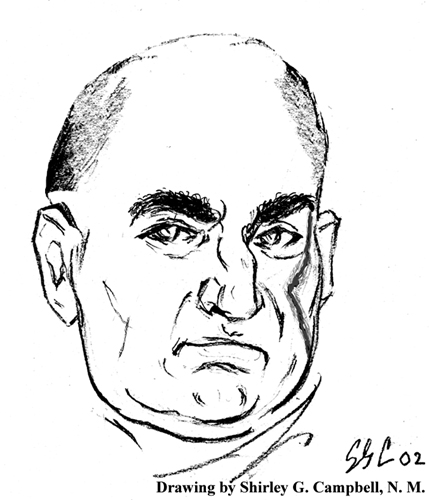
La Hire was furious because she had denied him and his men the opportunity to plunder the English goods. His neck veins bulged and pulsated with rage as he beat his staff several times on his leg. If the order had come from any one other than Jeanne, La Hire would, by now, have struck him viciously across the head with his baton! With each of his steps slamming into the ground he thundered, "Maid! Do you think it is wise to let them go? By the Devil's, I mean, by my staff, we could easily beat them!"
Unafraid of his fearsome temper, Jeanne calmly went to her friend. "Peace, La Hire. You will have many opportunities in the future to defeat these Godons soundly. I have not given up hope that I can persuade the King to attack Paris. Therefore we need to conserve our strength for this great purpose."
The great lumbering bear instantly stopped in his tracks. Like an iron wall he stood motionless as he allowed Jeanne's words to sink into his thick skull. He growled with pleasure, "By Saint Denis! Paris! Yes, of course! As usual, Maid, you are right! Paris, it shall be!"
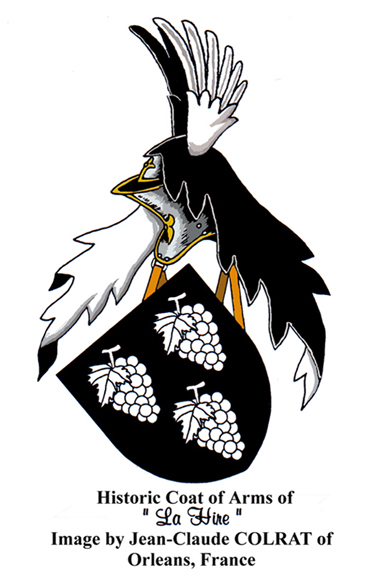
Jeanne still could not believe that Charles would betray all that she had worked so hard to accomplish. With the town secured by our forces, the army settled down in the countryside waiting for the King and his entourage to arrive. During this lull in activity, a group of prostitutes came into camp. Jeanne was furious and came after them with her sword drawn. The prostitutes, fearing for their lives, ran in terror. While Jeanne was chasing them, she accidentally struck her sword's blade on a low-hanging branch. Forthwith the top ten inches of the blade snapped off! I stopped my pursuit of Jeanne only long enough to pick up the blade's end. By the time I reached Jeanne, she had already captured the group. Holding her hands behind her back she addressed them firmly but kindly. "Don't let me find you again among the men! If I do, I will be forced to make your lives most uncomfortable! You should find nice men to marry and raise good families." As I came up behind her, she ordered me, "Squire, give them some money."
Behind my back, I slipped the damaged blade into my belt because as yet Jeanne did not realize that she had broken her sword. I took out a handful of silver coins and gave each woman one. At that, Jeanne ordered the prostitutes out of the camp. "Go now, and may God be with you." The women left, dazed by her encounter. Stopping to look back at Jeanne, one of the women raised her hand in a kind of salute before running off. Jeanne had a contented look, pleased that she had handled the situation well.
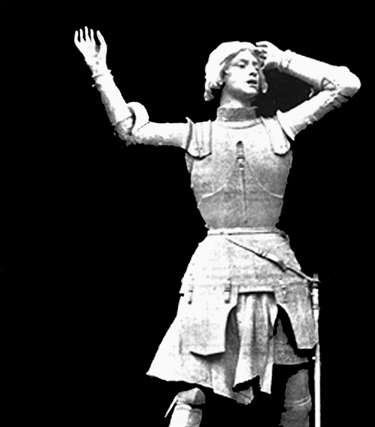
She turned back to me and it was then that she observed the portion of the blade that I held out to her. At first she did not comprehend that her holy sword had actually snapped in two! It was with a look of bewilderment that she took the blade from me. She looked at me then back at the sword. Slowly the reality of the predicament came crashing down upon her and she cried as she fell to her knees. "My sword! My sword! Oh, what have I done? I have broken the sword of Saint Catherine. Oh, my sword!"
There was little that I could do to console her. What could I say? What could I do? Poor Jeanne, things were going badly for her on all sides, and now she had shattered her beloved sword. For a long time, I was silent in my muddled thoughts. Fortunately an inspiration came to me and I tried to be as encouraging as I could. "Jeanne, I have an idea. I can have your sword sent to Tours, to Monsieur du Lac. Remember, he is the best armorer in all of France."
I took the two portions of the blade in hand and showed her how they could still fit snugly together. "Look how the break is clean. I am sure he will be able to do it." Jeanne silently implored me with her sad blue eyes. "Let me handle all the arrangements. This very day, by the fastest courier I can find, I will send it to Tours! You will see, Jeanne; it will be mended in no time." Unfortunately, Jeanne would never see the sword of Saint Catherine again.
When the King arrived that night, he found Jeanne very upset and someone informed him about the incident. He must have had a twinge of conscience, or perhaps he was feeling the same sort of compassion one might feel for a wounded animal. At any rate he tried to console her by signing a decree that released for all time, the people of Greux and Domremy from any obligations to pay the royal tax.
He summoned Jeanne to his private chambers and without Lord George or the Archbishop's breathing down his neck, he was compassionate to her. As she knelt before him, Jeanne's heart was filled with gratitude. "Thank you, your Royal Highness, for granting me this boon. The people of my village will bless and praise your name always, for your gracious generosity." The King smiled sympathetically as he handed her the decree.


By Tuesday, August 2nd, the King's entourage had reached Provins. Jeanne was at her wits' end, trying to persuade Charles to move on Paris, which was only fifty miles away. Meanwhile, Charles' advisors came up with another two-week truce with the Duke of Burgundy. This truce allowed our army to try to take Paris, so the King gave the order to march toward Paris! At least it was a start.
It was here too, that Jeanne received an urgent letter from the people of Reims. They told her of their mistrust of the King's counselors and their fear that Charles would abandon them to the ravages of the Burgundians. Jeanne did her best to reassure them in a letter that she dictated.
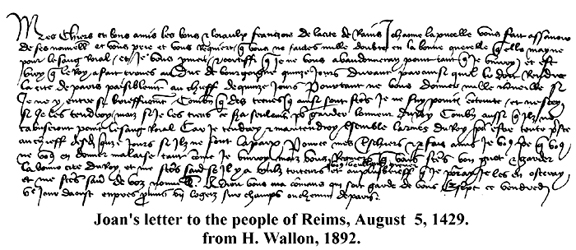
+ JHESUS MARIA +
"My dear and good friends, the good and faithful French of the city of Reims: Jeanne the Maid sends you her news and implores you to have no doubt in the good fight she is waging on behalf of the royal blood. I promise and swear to you that I shall never abandon you as long as I shall live.
It is true that the King has made a fifteen-day truce with the Duke of Burgundy, on condition that Burgundy will peacefully hand over the city of Paris to the King. I do not like truces made in this way. Therefore be not surprised if I do not enter Paris right away. I do not know whether I will keep this truce but if I do, it will only be to safeguard the King's honor. If they do not make peace at the end of the said fifteen days, the enemy will not overthrow the royal blood, for I shall hold the King's army together in readiness. For this reason, my very dear and perfect friends, I pray that you will give yourselves no worry as long as I shall live, but I require you to keep alert, and guard the good city of the King; and let me know if there be any turncoats who would harm you, and as quickly as I can do so, I will personally force the enemy out. Let me know your news. To God I commend you. Written this Friday, 5th day of August, 1429, near Provins in a camp in the fields on the way to Paris."
I was disheartened about the prospect for peace. "Jeanne, will true peace ever come to our land?"
"Good Squire, peace with the Burgundians and peace with the English are two quite different things. So far as the Duke of Burgundy is concerned, I have begged him by letters, and through his ambassadors, to make peace with the King. As for the English, peace will occur only when they return to their own country - England."
Jeanne detested the signed truce and was determined to speak her mind to the King. Unannounced she entered the palace's gardens looking for Charles. When he caught sight of her, he was naturally surprised but also displeased with her behavior. He turned without a word and walked away, trying to escape, but Jeanne doggedly followed only a few steps behind. "Your Majesty, I do not trust these false Burgundians! They will never live up to their side of the truce."
The King walked deeper into the manicured foliage when he suddenly wheeled around. "Ave Maria, but you are annoying! Will you please stop following us!"
"Your Majesty, I, I did not imagine that my behavior was so annoying to you. I am sorry, but I must speak. Please hear me out and then I will leave."
Charles was barely able to contain his anger. "Well, if you must! Just be quick about it!"
"Your Majesty, we must go to Paris now before the Burgundians and English strengthen their defenses. We must attack now while we still have the ability to capture your Capital. If not, you will lose Paris for a very long time."
"Is that it? Are you finished?" He said as he impatiently tapped his foot. In astonishment Jeanne nodded her head. So with a curt wave of his hand the King ordered her out. "Then you may go."
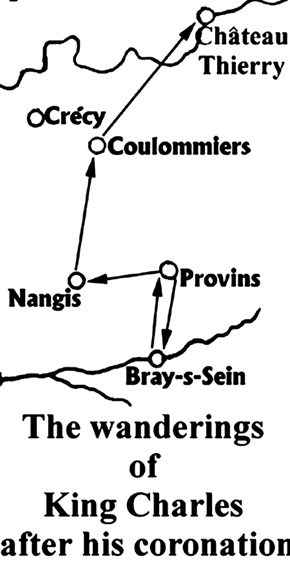

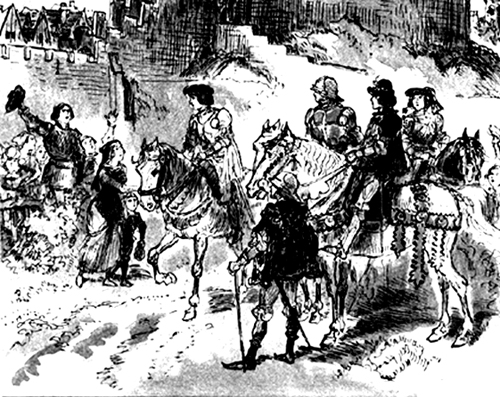
Again the King's train moved on to Crepy-en-Valois. Here the people came out to greet him with great celebration. "Noel, long live King Charles!" they shouted repeatedly. On this occasion, Jeanne was riding between Count Mortain and the Archbishop. She was profoundly moved by the people's warm welcome. "These are good people. I have seen none elsewhere who have rejoiced as much at the coming of our noble King. How happy should I be if when my days are done that I might be buried here!"
The Archbishop, hearing this, seized the opportunity and with a false sense of concern asked, "Oh, Jeanne, in what place do you hope to die?"
She was surprised that he had taken notice of her idle comment. "Where it shall please God. I am not certain of either the time or place, any more than you yourself are. May it please God, my Creator, that I might lay my arms aside and retire to serve my father and mother and take care of their sheep with my brothers, who would be so happy to see me again!"
My heart broke to hear her speak in such a melancholy tone. How her heart must have ached. How she must have longed to go home, now that the King had betrayed his own cause and the cause of God, as well! At times, I think, she would have left the King's service. Yet Charles would not let her go, because he feared displeasing God with his ingratitude. To me, he showed more ingratitude by keeping her a veritable prisoner, than by letting her go home. Perhaps what he feared more than God's wrath was the trouble Jeanne would cause him on departing court. Jeanne would find and lead a band of free-lancers, attacking the King's enemies' wherever she found them! He could never control her then, and she would ruin this wonderful truce.
So what caused Jeanne to remain and languish at Charles' side? Surely, it was not the King's will; it had to be something more important to her. I quietly pondered this question within my heart and this is the conclusion I came to. Jeanne must have felt it was God's will that she stay with the King. Thus her strong sense of duty to her true Sovereign, God, was the unbreakable chain that bound her to King Charles.
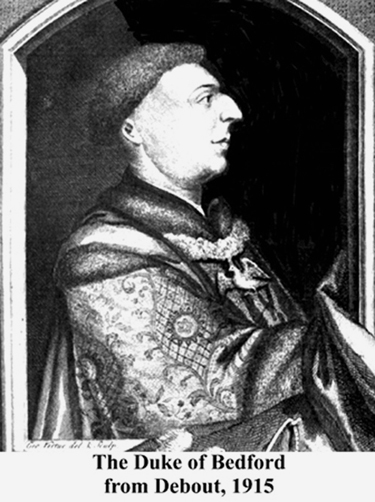
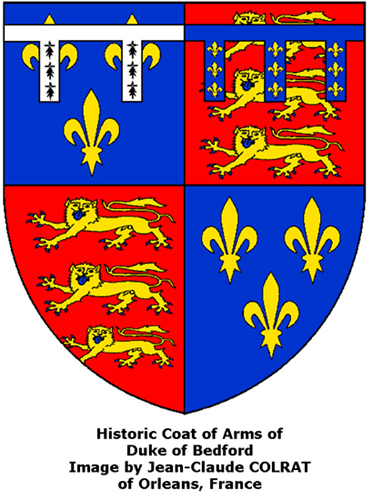
By August 13th, the Duke of Bedford, the English regent, was acting very sure of himself and wrote a long letter to Charles. It was read aloud before the King, his advisories, Jeanne and all the captains. In this letter Bedford insulted the King, accusing him of prolonging the war and being in league with the Devil. He challenged Charles to personal combat; the winner would take all. He boasted he would win, despite any witchcraft Jeanne might use against him. La Hire shouted boldly as he strutted before the assembly, "By God's thunder, this Godon speaks boldly to cover his fear! By my staff! We can make mincemeat out of their army! Let us face them, and then we will see who has a better claim to God!" All the captains joined in making a great clamor, so much so that the King gave in to their desires.
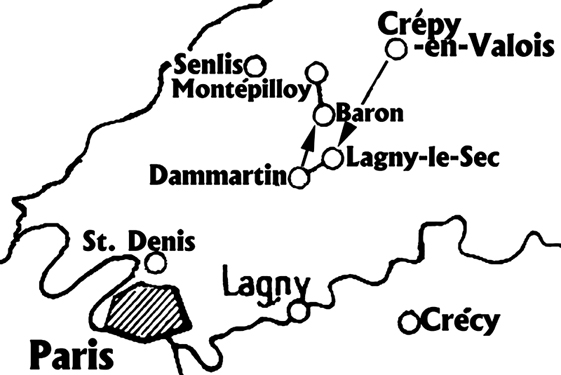
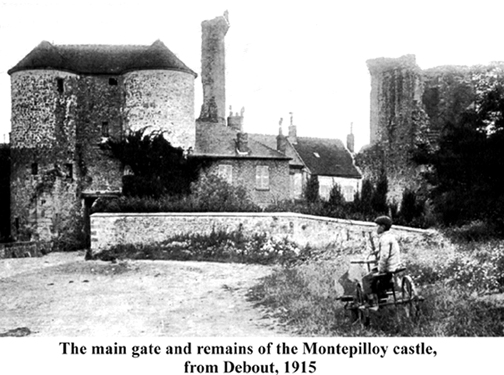
On Monday, August 15th, just as the sun broke over the horizon, our army marched! The objective, to search and find Bedford and the English. We came upon them quite by chance, between the small town of Montepilloy and the town of Senlis. We established our position on the heights near the town of Montepilloy. Already well established some six miles away near the town of Senlis, the English waited for us behind a wall of wagons and an array of planted poles, sharpened points forward. In front of this they had dug a series of trenches. Two alternating rows of long bowmen stood behind these defenses and behind them, en masse, were the remainder of the English forces, including Bedford himself! An abbey named 'Our Lady of the Victory' and the river Nonette guarded their rear. The town of Senlis and a thick row of wide hedges protected their left flank. To the right of the English position was a garrison of Picard and Burgundian soldiers.
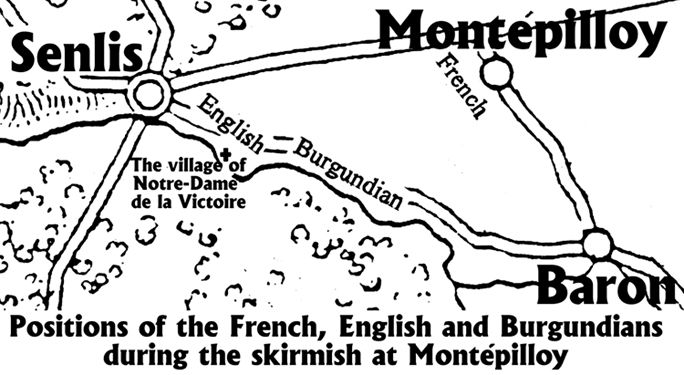
We did not rush at them blindly, because we remembered the lessons of Agencourt and Crecy. First we heard Mass, in honor of the Feast Day, the Assumption of the Blessed Virgin, after which the army mounted and positioned themselves for battle. We challenged the English to come out of their defenses. In turn, the English challenged us to come down to them. Bedford was terrified of Jeanne and would not allow a full-scale attack. The morning passed in small skirmishes, jousting, and single combat between knights. The Duke d'Alençon sent word to Bedford that if the English were willing to come out of their defenses, the French would withdraw giving them enough room to arrange themselves for battle. The English flatly rejected d' Alençon's plan.
Jeanne realized that the King was doing everything in his power to hinder and prevent her from accomplishing her mission. In her frustration she started to become desperate and was willing to bend the rules. Jeanne knew that it was against Church law to attack on a feast day, so she tried to goad the English into attacking us. With battle pennant in hand, she confidently cantered her magnificent white stallion down from the heights of Montepilloy. Close behind, riding in good battle order, came La Hire and Mortain with their cavalry companies and her personal staff.
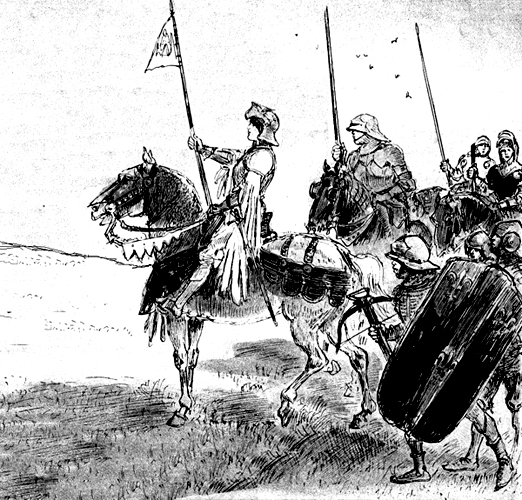
By now Hugh and I had become good friends and so he rode by my side as we all descended the hill.
We rode the six miles to the English position, where Jeanne stopped and ordered us to wait for her because she wanted to advance alone to the enemy. She then rode the last few yards right up to the English defenses. In full view and clear shot of the archers who stood no more than thirty feet away, she dismounted and climbed to the top of the first earthen embankment. There she stood as she defiantly planted her pennant into the mound, thrusting it boldly out to one side. She rested her other hand on the small war ax that hung from her belt. "Come, you Godons, give fight to the men of France! You have the courage to murder women and children. Come now and try your hand with true French warriors. Do you fear us so much that you will not venture forth, even if we give you leave and room to do so? Ah, then it is true! Godons are cowards!"
The response to Jeanne's challenge was universal silence. All the English stood paralyzed with fear just from the sight of her. Not a sword was drawn; not an arrow flew. My heart was in my throat as Jeanne advanced a few more feet toward them! Was she going to walk right into the midst of the enemy and take Bedford prisoner? She struck their wooden barricade with the end of her pennant's staff. The silence was so intense that the sound of the strike reverberated like a thunderclap. Yet the English made no response! Since they would not answer her challenge, she turned her back on them and slowly returned to our position. As for the English, they were so terrified that even with her back to them, they did not strike.
At her display of courage, the men of our company exploded with cheers of praise. All the way back to our camp the acclaim never stopped. Upon Jeanne's return, news of her deed of valor spread swiftly and the army went wild over her act of bravery! Never before had anyone seen the like! However, no large-scale action took place that day and night was fast approaching. The two sides returned to different towns, the English to Senlis and we to Crepy.
If Bedford and the English feared Jeanne, King Charles feared Bedford and the English just as much. He feared losing all in this one battle. He also feared displeasing the Duke of Burgundy, who according to La Tremoille was on the verge of giving Paris over to him. So the King ordered us to withdraw from the area. Demoralized by his order, Jeanne freely spoke her mind to d'Alençon. "My good Duke, I try to understand why the King acts the way he does, and yet I remain dumbfounded. I can't help feeling hurt and betrayed by his actions. He does not seem to listen to me anymore. I might as well not be here, for all the good I do. Had we but stayed at Montepilloy, we could have gained the best of the English by decisively destroying their army! We might even have captured Bedford himself! Then we could have easily won Paris. The war would have been over, and we could have traded Bedford for the Duke of Orleans. Did I do something to displease God? Is that why I failed?"
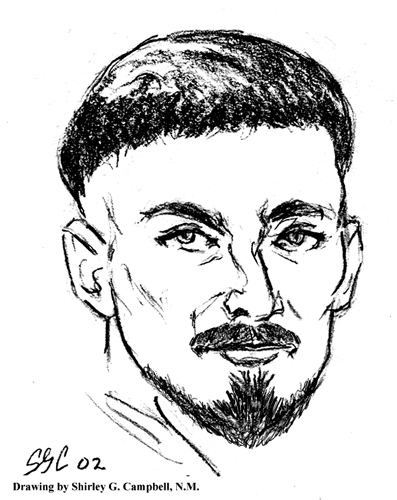
D'Alençon took hold of Jeanne's shoulders. "First, you did nothing to offend God, and you did not fail Him! You took a great risk, going right up to the Godons and challenging them the way you did. No one else would have done what you did, not in a thousand years! So you are not at fault; you did all you could do. If God had wanted us to do battle with the enemy, He would have used your words as a catalyst. It seems to me that since your challenge had no effect on them, obviously God did not intend for us to fight."
D'Alençon continued as Jeanne silently nodded her head and looked despondently at the ground. "Now, as for the King and his advisers, I will speak bluntly to you about them. Please, Jeanne, forgive me for what I am about to say because you won't like it, but at least you will understand why things are happening the way they are."
"You may well ask why the King's advisers, Lord George and the Archbishop, want to make life so easy for the enemy and so hard for the fighting men. That is easily answered. They want money and from money, power. How do they make their money? Easily answered... from the war. They buy and sell with the enemy, not only the Burgundians, but the English, as well!"
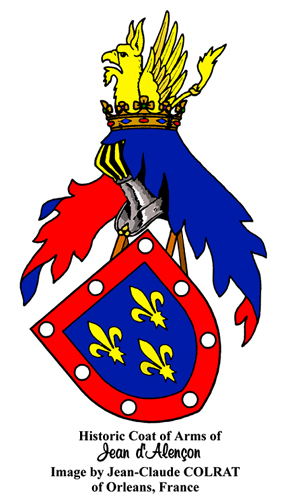
Jeanne looked at him in wide-eyed disbelief while the Duke nodded his head to affirm his words. "These two men do not want Paris captured. That is why the King has gone everywhere but Paris."
"But Jean, how is the taking of Paris to their disadvantage?"
D'Alençon annoyed by her naiveté barked, "By God, Jeanne! Why don't you understand?" His temper quickly cooled though as he looked intently into her melancholy blue eyes. "If you take Paris, the war would soon be over and then their war-time business would end." He spoke slowly as if to a child, "Besides, they don't want you to gain Paris for the King. They want to give it to him themselves through their negotiations. They fear and hate you, my friend. They are afraid you might have them deposed from their places of honor with the King." His frustration reared up once more, as he sternly demanded, "Do you understand?!"
Unfortunately his words seemed to go completely over her head. "I don't want to do that! I don't want anything for myself, and I told them that many times."
"Yes, I know you have, but you see, in their world, everyone is out for himself. They believe everyone is like that, even you! And if not you personally, then someone who would use you for their own ends, like the High Constable, for example."

Jeanne put the side of her index finger into her mouth and biting down on it hard, cried, "Oh, my good Duke, can your words be true? They are so hard for me to accept."
He shook her shoulders once more trying to make her see reason. "Listen! Lion's don't stop eating meat just because a visionary in armor commands them to." From Jeanne's bewildered look D'Alençon realized that he had not succeeded. He sighed deeply as he gently pulled her hand away from her mouth and began to massage the deep groves caused by her teeth saying gently, "Please, Jeanne, guard yourself against these men. They mean to put you in a bad light so that the King will no longer trust you."
Jeanne's face filled with dread. "This thing that God has asked me to do is getting harder and harder. For the first time in my life, I'm afraid! What will become of me, my friend?"
